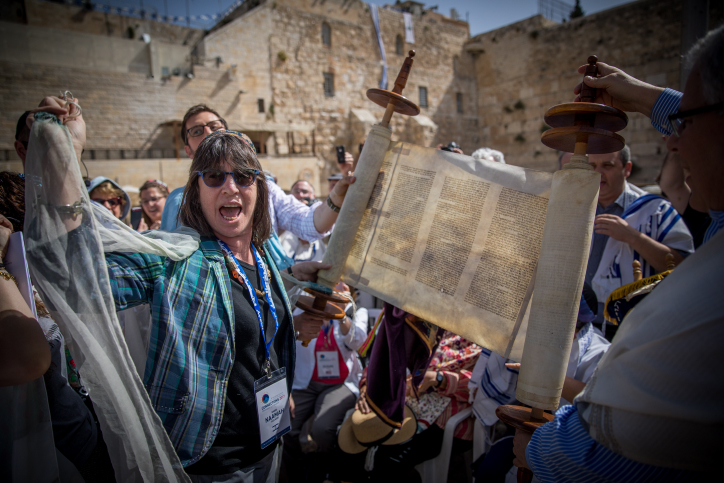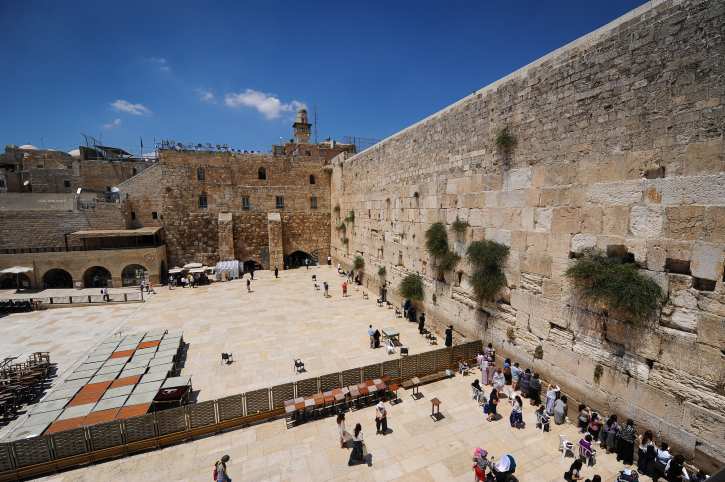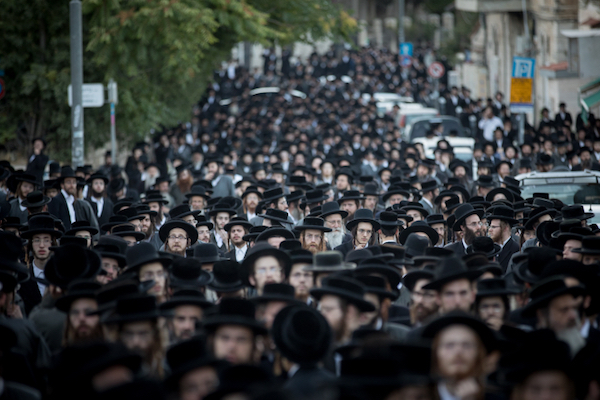The Israeli government’s decision to abandon a deal creating an egalitarian prayer space at the Western Wall led to an unprecedented rift with Diaspora Jewry. But American Jews, and the Reform Movement in particular, are merely collateral damage — caught in the crossfire of an internal ultra-Orthodox power struggle.
By Eli Bitan

With all the coverage of the brouhaha among Diaspora Jewry over the suspension of a deal to create a pluralistic prayer space at the Western Wall, one might reasonably think that the ultra-Orthodox parties in the Israeli government chalked up a victory last week. They didn’t. The real victory was won by their biggest opposition — from within the ultra-Orthodox community.
Interestingly, the ultra-Orthodox anger over the Western Wall deal targeted neither Reform Jews nor Prime Minister Netanyahu. Most of their ire was saved for the ultra-Orthodox political parties and rabbis who backed the compromise.
The narrative that was reported — mostly unchallenged — throughout the Jewish American media, as well as in Israel, was that ultra-Orthodox politicians were striking back against the evil Reform Movement, which they view as a clear and present threat to the very soul of Judaism. The version of events that suggests the Western Wall compromise was forced on the ultra-Orthodox politicians couldn’t be further from the truth. The deal, which was signed a year and a half ago, was formulated with the ultra-Orthodox, including Western Wall Rabbi Shmuel Rabinowitz and other prominent ultra-Orthodox rabbis.
So who did protest the Kotel deal, as it’s known? Every single ultra-Orthodox rabbi, politician, journalist, or writer who isn’t directly associated with the ultra-Orthodox political parties.
The first was Ashkenazi Chief Rabbi David Lau, who attacked the Western Wall rabbi for his support of the deal. After that came Shlomo Amar, the Sephardic chief rabbi of Jerusalem, an ideological opponent of Shas, who also expressed his disapproval for the deal. Then the rest: Rabbi Auerbach, who heads a sect of radical ultra-Orthodox Jews in Jerusalem, top Sephardic rabbis, and many, many others — all of whom openly oppose the ultra-Orthodox political establishment.

Their biggest fear is losing the ultra-Orthodox population’s leverage and deterrence over the rest of Israeli politics, in this case manifested in their political parties’ willingness to compromise on matters of religious principle. The ultra-Orthodox community’s political power in Israel is borne of the fact that the overwhelming majority of governments in Israel’s history have relied on ultra-Orthodox parties in order to form a majority coalition in parliament. It is almost impossible to form a functioning government without them.
Red lines
In the eyes of the ultra-Orthodox opposition, the Western Wall deal was yet another step in the religious political parties’ willingness to compromise on a growing list of issues they consider sacred and holy. The same type of criticism has been sounded time and again over efforts to end an historical exemption to Israel’s mandatory military conscription law for ultra-Orthodox men, and recent high-profile arrests of army deserters within the community. Conflicts like that, which pit the ultra-Orthodox community against Israel’s secular parties and population, would have led to the collapse of the government in the past. One doesn’t hear such threats anymore. “The headlines scream ‘crisis,’ yet a seat at the government table is more enticing,” one prominent ultra-Orthodox commentator wrote on Twitter.
None of that, however, was enough to put pressure on the ultra-Orthodox members of Knesset, who still enjoy widespread support from their community. That was until ultra-Orthodox media outlets unaligned with any political party joined the fray. The moment the Western Wall compromise was reached, two major ultra-Orthodox news sites began sounding their opposition. Then came the radio stations and the weekly newspapers. The religious politicians in Israel’s government, along with the Western Wall rabbi, all tried to wave off the criticism against them, but to no avail.
This was not an expression of disdain for Reform Judaism as much as it was a sign of the growing power of both the ultra-Orthodox opposition and that of young, independent journalists in the community.
The ultra-Orthodox MKs understood that despite the fact that the compromise over the Western Wall was likely the best deal they can get — especially considering that Israel’s High Court of Justice will almost certainly rule in favor of pluralistic prayer options at the holy site — they simply can’t explain that to the Haredi public, which demands that its politicians draw clear red lines over which they are willing walk out of the ruling coalition.

“Anyone who doesn’t have a red line is worthless,” an ultra-Orthodox journalist who has been following the story since its onset explained to me. “Every bit of the ultra-Orthodox parties’ political power was based on the fear that the Haredi MKs can always leave the coalition, thus bringing down the government. This fear has been replaced by an understanding that no matter what happens, the ultra-Orthodox will stay. Work on the Sabbath? The Kotel? Haredi conscription? It doesn’t matter, the ultra-Orthodox will remain in the government. And while most of the ultra-Orthodox population continues to support their elected officials, the politicians — perhaps for the first time in their lives — are now acting in accordance with public criticism against them, not necessarily in line with their own positions.”
Even faced with an outcome that will be likely worse for the ultra-Orthodox if the government’s Western Wall deal is abandoned and the issue is adjudicated in court, he explained, much of the ultra-Orthodox street simply want the leadership to stand strong on their principles. “An anti-religious ruling by the High Court is preferable to our consent and recognition of the [Western Wall] deal. No one wants to think that Litzman and Gafni supported handing over the Kotel to Reform Jews,” he said, referring to two prominent ultra-Orthodox politicians.
It is important to understand just how much power the independent ultra-Orthodox websites have. The protests against conscription and arrests of ultra-Orthodox defectors, which have erupted over the past half year, brought establishment ultra-Orthodox politics to the edge. Thousands of young men have hit the streets to protest the conscription law, and the political parties that supported it, leading to the establishment of new organizations in Israel and abroad to fight the conscription of ultra-Orthodox men into the IDF.
Nevertheless, polls show that support for the ultra-Orthodox parties remains steady, and aside from one prominent ultra-Orthodox Jerusalem sect, there is no one who could actually challenge the consensus political support they enjoy. And yet, the three major Haredi politicians — Aryeh Deri, Moshe Gafni, and Yakov Litzman — understand the anger on the street they took action.
The ultra-Orthodox politicians will attack Reform Judaism in order to save themselves. Moshe Gafni, of the United Torah Judaism party, sounded the opening shot at a Haaretz conference last month, making clear thatm at least on the Palestinian issue, he is far closer to the peace camp than the right-wing government with which ultra-Orthodox politicians are traditionally aligned. But, he continued, he would rather vote for policies he disagrees with from inside a right-wing government than be part of a left-wing coalition that allies itself with Reform Jews.
Eli Bitan is a journalist in the ultra-Orthodox press in Israel, and is a blogger on Local Call, where a version of this post appears in Hebrew. Read it here.
